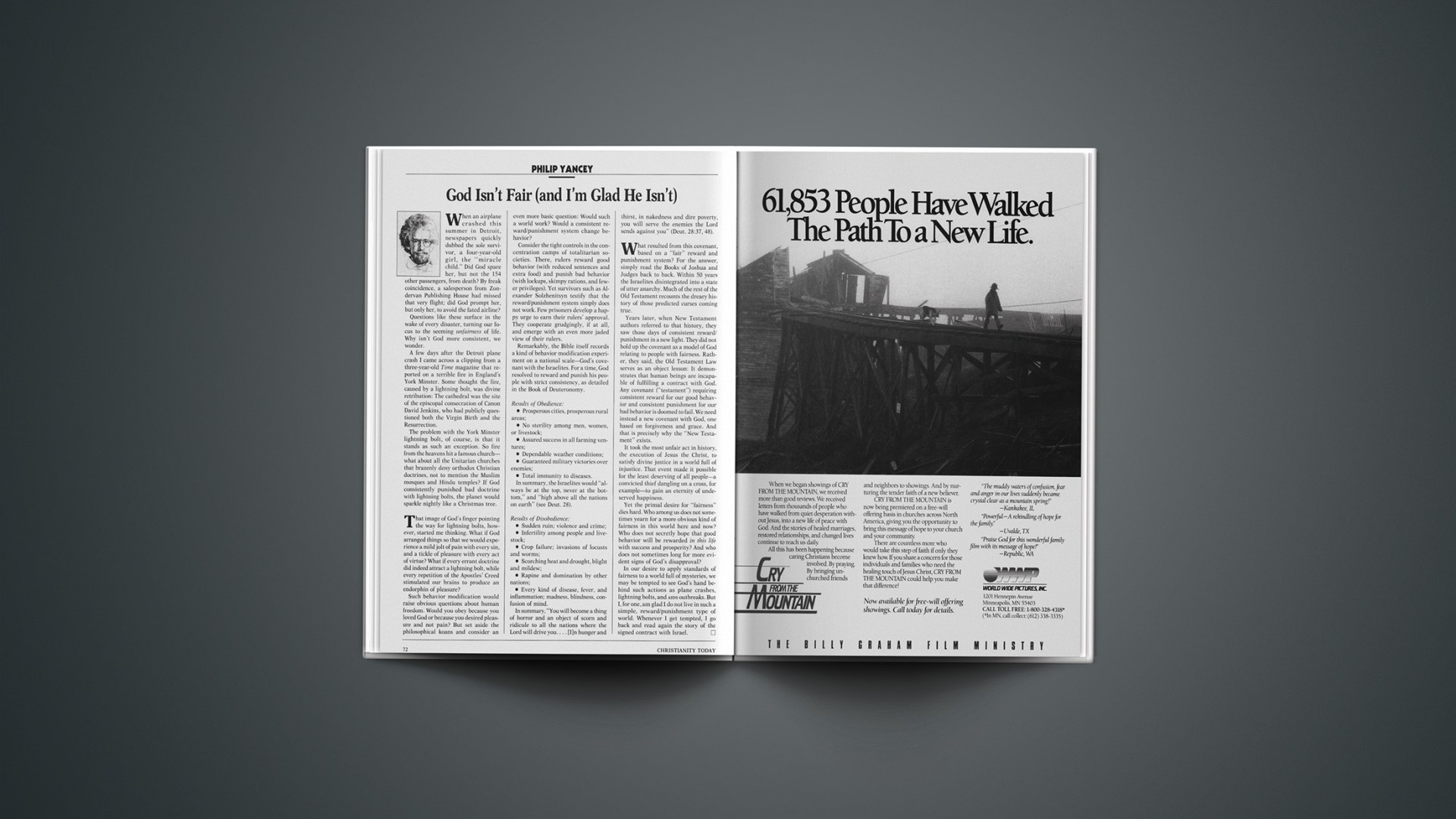When an airplane crashed this summer in Detroit, newspapers quickly dubbed the sole survivor, a four-year-old girl, the “miracle child.” Did God spare her, but not the 154 other passengers, from death? By freak coincidence, a salesperson from Zondervan Publishing House had missed that very flight; did God prompt her, but only her, to avoid the fated airline?
Questions like these surface in the wake of every disaster, turning our focus to the seeming unfairness of life. Why isn’t God more consistent, we wonder.
A few days after the Detroit plane crash I came across a clipping from a three-year-old Time magazine that reported on a terrible fire in England’s York Minster. Some thought the fire, caused by a lightning bolt, was divine retribution: The cathedral was the site of the episcopal consecration of Canon David Jenkins, who had publicly questioned both the Virgin Birth and the Resurrection.
The problem with the York Minster lightning bolt, of course, is that it stands as such an exception. So fire from the heavens hit a famous church—what about all the Unitarian churches that brazenly deny orthodox Christian doctrines, not to mention the Muslim mosques and Hindu temples? If God consistently punished bad doctrine with lightning bolts, the planet would sparkle nightly like a Christmas tree.
That image of God’s finger pointing the way for lightning bolts, however, started me thinking. What if God arranged things so that we would experience a mild jolt of pain with every sin, and a tickle of pleasure with every act of virtue? What if every errant doctrine did indeed attract a lightning bolt, while every repetition of the Apostles’ Creed stimulated our brains to produce an endorphin of pleasure?
Such behavior modification would raise obvious questions about human freedom. Would you obey because you loved God or because you desired pleasure and not pain? But set aside the philosophical koans and consider an even more basic question: Would such a world work? Would a consistent reward/punishment system change behavior?
Consider the tight controls in the concentration camps of totalitarian societies. There, rulers reward good behavior (with reduced sentences and extra food) and punish bad behavior (with lockups, skimpy rations, and fewer privileges). Yet survivors such as Alexander Solzhenitsyn testify that the reward/punishment system simply does not work. Few prisoners develop a happy urge to earn their rulers’ approval. They cooperate grudgingly, if at all, and emerge with an even more jaded view of their rulers.
Remarkably, the Bible itself records a kind of behavior modification experiment on a national scale—God’s covenant with the Israelites. For a time, God resolved to reward and punish his people with strict consistency, as detailed in the Book of Deuteronomy.
Results of Obedience:
- Prosperous cities, prosperous rural areas;
- No sterility among men, women, or livestock;
- Assured success in all farming ventures;
- Dependable weather conditions;
- Guaranteed military victories over enemies;
- Total immunity to diseases.
In summary, the Israelites would “always be at the top, never at the bottom,” and “high above all the nations on earth” (see Deut. 28).
Results of Disobedience:
- Sudden ruin; violence and crime;
- Infertility among people and livestock;
- Crop failure; invasions of locusts and worms;
- Scorching heat and drought, blight and mildew;
- Rapine and domination by other nations;
- Every kind of disease, fever, and inflammation; madness, blindness, confusion of mind.
In summary, “You will become a thing of horror and an object of scorn and ridicule to all the nations where the Lord will drive you.… [I]n hunger and thirst, in nakedness and dire poverty, you will serve the enemies the Lord sends against you” (Deut. 28:37, 48).
What resulted from this covenant, based on a “fair” reward and punishment system? For the answer, simply read the Books of Joshua and Judges back to back. Within 50 years the Israelites disintegrated into a state of utter anarchy. Much of the rest of the Old Testament recounts the dreary history of those predicted curses coming true.
Years later, when New Testament authors referred to that history, they saw those days of consistent reward/punishment in a new light. They did not hold up the covenant as a model of God relating to people with fairness. Rather, they said, the Old Testament Law serves as an object lesson: It demonstrates that human beings are incapable of fulfilling a contract with God. Any covenant (“testament”) requiring consistent reward for our good behavior and consistent punishment for our bad behavior is doomed to fail. We need instead a new covenant with God, one based on forgiveness and grace. And that is precisely why the “New Testament” exists.
It took the most unfair act in history, the execution of Jesus the Christ, to satisfy divine justice in a world full of injustice. That event made it possible for the least deserving of all people—a convicted thief dangling on a cross, for example—to gain an eternity of undeserved happiness.
Yet the primal desire for “fairness” dies hard. Who among us does not sometimes yearn for a more obvious kind of fairness in this world here and now? Who does not secretly hope that good behavior will be rewarded in this life with success and prosperity? And who does not sometimes long for more evident signs of God’s disapproval?
In our desire to apply standards of fairness to a world full of mysteries, we may be tempted to see God’s hand behind such actions as plane crashes, lightning bolts, and AIDS outbreaks. But I, for one, am glad I do not live in such a simple, reward/punishment type of world. Whenever I get tempted, I go back and read again the story of the signed contract with Israel.










